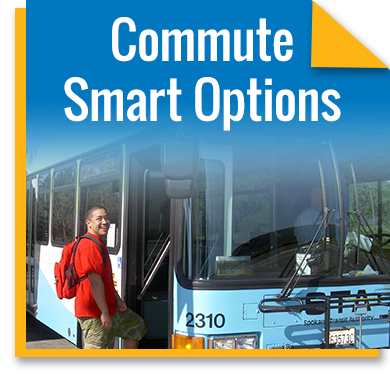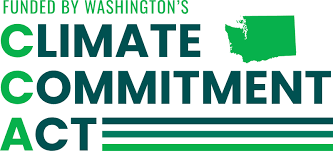
About the Commute Trip Reduction (CTR) Law
In 1993, Spokane County implemented the Commute Trip Reduction (CTR) Law (RCW 70A.15.4000-4110) to reduce traffic congestion, air pollution and petroleum consumption through employer-based programs that encourage the use of alternatives to driving alone. Alternatives include riding the bus, carpooling, vanpooling, bicycling, walking, working a compressed work week or teleworking.
In 2006 the Legislature unanimously adopted changes to the CTR law to make the program more effective, efficient and targeted. Implementation of the CTR Efficiency Act began and baseline surveys were conducted in April 2007. In 2015, each jurisdiction revised their CTR Plan and published new CTR goals for their employers to achieve 6 percentage point increase in commute alternative use from their baseline and/or a 13% reduction in their VMT (vehicle miles traveled).
The law requires major employers to develop and implement an employee commute program to reduce the number and length of drive-alone commute trips made to the worksite. Local jurisdictions implemented ordinances to define how the law would apply to employers in their area.
The CTR Law is working
The CTR program benefits our state’s transportation system, economy, CTR participants and other drivers on the road.
Between 2007 and 2016:
- Employees at nearly 1,000 CTR-affected worksites across the state increased their non-drive-alone trip rate from 34.3 percent to 39.1 percent, representing a 4.8 percentage point increase from the baseline.
- They left about 22,400 cars home every day, and commuted by other means such as bus, vanpool, train, walking, biking or teleworking, resulting in less traffic congestion.
- The average vehicle miles traveled per surveyed employee declined by 7.4 percent. The overall miles decreased by about 79 million miles annually. This results in a reduction of 3.7 million gallons of fuel, saving commuters almost $10 million in fuel expenditures.
- Locally, in Spokane County, employers reduce over 6,300 trips and over 136,000 miles from being driven on our roadways each day.
Source: 2017 CTR Report to the Washington State Legislature.
To read more about the costs and benefits of the CTR Program, download the 2017 CTR Report To the Washington State Legislature. (721KB PDF)
![]()
 Spokane County CTR Ordinance
Spokane County CTR Ordinance
(official copies may be obtained from the Auditor)- CTR Law (RCW 70A.15.4000 - 70A.15.4110)
- Minimum Requirements of the CTR Law
- Who is affected by the CTR Law?
- What is Good Faith Effort?
- Frequently asked questions about CTR
- Terms of Use
 |
 |
|
“The CommuteSmartNW Office is supported with funding from Washington’s Climate Commitment Act. The CCA supports Washington’s climate action efforts by putting cap-and-invest dollars to work reducing climate pollution, creating jobs, and improving public health. Information about the CCA is available at Climate.wa.gov.” |
|





